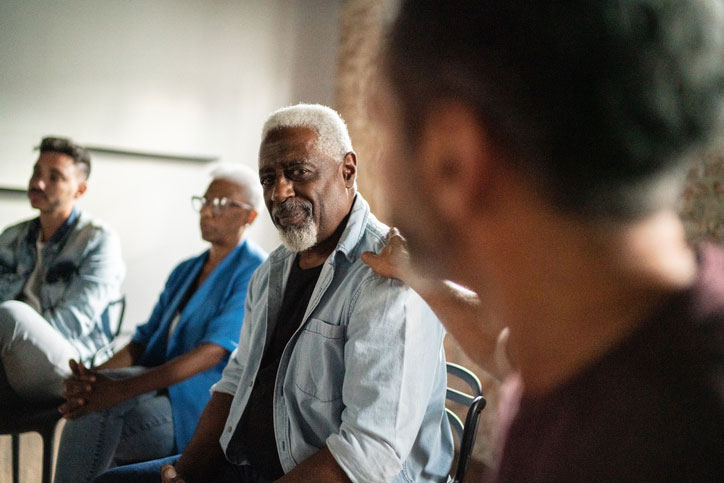Written by Dr. Emily R. Thornton, PhD, LCADC , Last Updated: November 10, 2025
Becoming a peer support specialist requires personal recovery experience from substance use disorders, a high school diploma, 40-100 hours of approved training, supervised practice hours, and passing a standardized exam. The process typically takes 4-6 months and leads to state certification. Most states require at least 2 years of stable recovery before qualifying for certification.
Table of Contents
Peer support specialists occupy a unique role in addiction treatment. It's a role that has become increasingly important with the rise of substance use disorders (SUDs) across the United States, and a growing body of evidence that peer support can be key to beating those disorders over the long term.

Along with the unique role they play in the recovery process, there's also a unique path to becoming a certified peer support specialist. The steps mirror those of other substance abuse counselors, but also have significant differences.
We lay out all the qualifications and a step-by-step process for you to learn how to become a peer support specialist in almost every state.
How Peer Support Specialists Play a Serious Role in Addiction Treatment Throughout the Country
Peer support specialists are qualified assistants, advocates, counselors, and helpers for individuals attempting to recover from substance use disorders. They are uniquely qualified by way of real-world experience. You see, peer recovery specialists have themselves recovered from a substance use disorder or gone through the process with someone close to them.
It may seem obvious that people who have gone through recovery themselves offer essential knowledge and perspectives that other counselors who haven't can't. But substance abuse counseling today is very much an evidence-driven field of practice, so just saying it's obvious isn't enough.
Instead, it turns out that research has been backing up the idea that individuals supported by peer recovery specialists experience measurable benefits:
- Suffer fewer relapses during and after treatment
- Undergo fewer hospital admissions related to substance use
- Have fewer incidences of depression and anxiety
- Enjoy increased self-esteem and self-confidence
On top of the benefits to patients, peer counselors are a big hit with other substance abuse counselors. They offer insights and an ability to connect with patients that can't be had through any amount of college or experience.
Still, for peer counselors to be available, they have to follow the proper steps to obtain the credentials needed to work with patients. Forty-seven states have official paths to becoming a peer recovery counselor. The three states without formal peer support specialist credentials are Delaware, Nevada, and Wyoming, though these states may still employ peer workers under different titles or through federal programs.
What Qualifications Are Required To Become a Peer Support Specialist?

While each of those states has its own rules, the basic qualifications to become a peer specialist are simple:
- Be over the age of 18
- Hold a high school diploma or GED
- Have experienced issues with mental health or substance use
- Have at least 1-2 years of stable recovery
- A willingness to share your recovery experience with others
Those are a lower bar to clear than other substance abuse counseling positions. But they are also just the basic requirements you have to meet to get your foot in the door. The actual process of getting a certification to practice as a peer support specialist takes a little more effort.
7 Steps To Becoming a Peer Support Specialist
The steps to becoming a peer support specialist are faster and more straightforward than the steps to becoming a regular substance abuse counselor. But that doesn't mean they are any easier, just hard in a different way.
Each state regulates peer support specialists differently, and so the specific details of this process will shift slightly depending on where you are located. You'll find all of the basics are similar, though. These steps will walk you through each of them.
1. Fully Recover From Your Own Experience with Addiction
This is the first step, the hardest and the one no one wishes they had taken. You, or someone close to you, must have experienced a substance use disorder.
In some states, personal lived experience in recovering from a substance use disorder is required.
This is not a step you plan, but it's critical to becoming a peer support specialist. What you bring to the table that no one can teach is the hard-earned experience of clawing your way to recovery.
With that behind you, you can share your story, to serve as a role model, and to offer advice and guidance to others who are still stuck in addiction. Just as important, you have empathy and compassion to offer, grounded in genuine understanding. While other addiction counselors can empathize with patients, only you can identify with them with this step under your belt.
Most states require 1-2 years of stable recovery before you can pursue certification. This waiting period makes sure you've had time to build a solid foundation in your own recovery before supporting others.
2. Undergo and Pass a Criminal Background Check
Undergoing a criminal background check is a standard part of licensing or certification for all substance abuse counselors. It can take on a different weight if you are applying to become a peer support specialist, however.
That's because, in many cases, you wouldn't be qualified to apply for a peer support certification if you weren't disqualified by criminal activity at some point. It's tough to get through many kinds of addiction without running afoul of the law at some point.
If you're going to be any good at being a peer specialist, the odds are good you have a criminal record behind you.
That's why you'll typically find a specific list of disqualifying offenses for peer support background checks. States understand that your experience with the justice system itself can make you a good peer counselor. So having a stack of DUIs or even theft or robbery isn't necessarily going to trip you up.
Non-disqualifying offenses often include:
- DUI or DWI convictions
- Drug possession charges
- Theft or property crimes
- Disorderly conduct
Potentially disqualifying offenses may include:
- Sexual offenses, especially involving minors
- Violent crimes causing serious bodily harm
- Fraud or embezzlement involving healthcare
- Offenses committed while in a position of trust
A more serious criminal background might disqualify you, though you can also apply for a pardon or exception in many cases. Certification boards understand that who you are before and after recovery can be two very different people. Your own understanding of the same principle will be part of what makes you a valuable ally to patients in their own recovery efforts.
You'll also need to be done with your time as a prisoner or parolee. If you are still under supervision, you'll probably need to wait until your probation or prison term has been fulfilled.
3. Go through Peer Support Specialist Training Required in Your State

You only need a GED or a high school diploma to become a peer support specialist. Most people have that out of the way long before they get to the point of considering the job.
But while you don't need a college degree, you do need specific training to become a peer counselor.
That boils down to between 40 and 100 hours of specialized classroom instruction in subjects covering:
- Patient advocacy and empowerment
- Mentoring and education in substance abuse counseling
- Recovery support strategies and techniques
- Ethics and professional responsibilities
- Crisis intervention and de-escalation
- Documentation and confidentiality
Depending on where you are located, you may get this through a state-run training program, a verified private training organization, or have the option to go either way.
What to Expect: Training typically costs between $200 and $1,000, depending on your state and provider. Some states offer free or subsidized training programs. The time commitment is usually 1-2 weeks of full-time study or several weeks of part-time evening classes.
Finding Free Peer Support Specialist Training Online

A quick search will turn up all kinds of peer support specialist certification online programs, even some from various colleges. But you have to be careful when choosing these programs to ensure they provide training accepted by your state certification board.
Certified peer support specialist training is similar from state to state, but far from identical.
Some states do, in fact, offer free state-run peer support specialist training, both in-person and online. But those programs are the exception rather than the rule. You also can't count on training offered in one state to fulfill requirements elsewhere.
Your best bet in every case is to consult the state licensing agency or authorized certification board for a list of recognized training providers. Contact your state's behavioral health department or substance abuse agency for approved training programs in your area.
4. Build Experience Offering Support to Substance Use Disorder Patients
The majority of states that require peer support credentials require a set number of practice and supervision hours to earn them. You can stack up practice hours before or after your training by volunteering at treatment organizations.
In some states, work experience in behavioral health services may substitute for required training hours.
Practice hours are just basic time in contact with patients, usually assisting a substance abuse counselor or already-qualified peer support specialist. Supervision hours are different—this is a measure of the time you spend working directly with a qualified supervisor to discuss cases and go over treatment techniques and processes.
You can expect to need around 500 practice hours in most states and about 25 hours under supervision. In many cases, these requirements will be fulfilled with the assistance of your employers while you are in the process of getting your certification.
Timeline: If working full-time (40 hours/week), 500 practice hours takes about 3 months. Part-time volunteers may take 6-12 months to accumulate the required hours.
5. Take and Pass a Standardized Test of Peer Support Skills
The IC&RC (International Certification & Reciprocity Consortium) International Peer Exam is the most common test used for peer support certification.
Not surprisingly, the exam tests you on material that closely mirrors what you will have studied in the required training hours. There are four sections on the exam:
- Advocacy (helping clients navigate systems and access resources)
- Ethical responsibility (maintaining boundaries and professional conduct)
- Mentoring and education (teaching coping skills and recovery strategies)
- Recovery and wellness support (providing ongoing encouragement)
Ethical responsibility is the section that is weighted most heavily in the scoring of the IC&RC International Peer Exam, so study up on your professional responsibilities!
There are 75 scored questions plus another 10 for a warm-up, which you'll need to complete within two hours. Exams are offered either on a computer or on paper, but each state board may choose whether to provide both or only one format.
The scoring system is not based on a straight percentage of correct answers, but instead uses a more complex formula that accounts for the difficulty of various questions.
States that require a test but don't use the IC&RC exam usually cook up their own version that is pretty similar.
Cost: The IC&RC exam typically costs between $100 and $200, depending on your state. Some states offer fee waivers or reduced-cost testing for individuals receiving public assistance.
6. Get Continuing Education and Consider Earning a Professional Certification as a Peer Recovery Support Specialist
It's not strictly necessary to earn national professional certification as a certified peer support specialist. On the other hand, it's a great way to both hone your expertise and stand out among your peers for going the extra mile.
Professional certification is different than the state certification you'll already have earned to become a peer support specialist in the first place. The state credentialing process gives you the approval you need to practice and bill for peer counseling services actively. A national certification is a higher bar, evaluating your validated experience, expertise, and knowledge to show employers and clients that you are on top of your game.
You will also find peer support specialist certification online that is aimed at mental health peer counselors rather than peer recovery specialists in substance abuse.
The gold standard in peer support professional certs is the National Certified Peer Recovery Support Specialist (NCPRSS) from NAADAC, the Association of Addiction Professionals.
You'll find the requirements pretty familiar:
- Have a high school diploma or GED
- Have a minimum of two years of recovery from a substance use or co-occurring mental health disorder.
- Have at least 200 hours of direct practice in supervised peer recovery support.t
- Have attained at least 60 contact and training hours of peer recovery support education
- At least 6 of those hours must be in ethics education, and another 6 in HIV and other pathogen prevention training.ng
- Must agree to adhere to the NAADAC/NCC AP Peer Recovery Support Specialist Code of Ethics
- Submit at least two references, at least one professional
- Take and pass the NAADAC NCPRSS exam
The NAADAC exam is more intensive than the IC&RC test for peer support counselors. It consists of 125 multiple-choice questions that go into testing your knowledge of:
- The role and responsibilities of peer support specialists
- Basic and essential concepts of recovery practice and treatment
- Pharmacology of substance use disorders
- Professional and ethical concepts
Both because of the experience and educational requirements, it's common to pursue professional certification only after you've been on the job for a while in peer support work.
Continuing Education Hours Can Contribute to Your Professional Certification
With continuing education requirements to maintain your credentials, you can easily build up the additional expertise needed to pass the NAADAC exam.
Pretty much every state that offers a credential for peer support work also requires that you fulfill ongoing continuing education to keep it.
Continuing ed is a process similar to earning your original required education hours. During each renewal period—typically two years—you'll have to spend a set amount of hours in classes that continue to enhance your skills as a peer recovery specialist.
The big difference is that while the state or licensing board requires you to obtain these hours from approved providers, the subject can be almost anything related to addiction counseling. You can find courses that build your skills in crisis management, co-occurring disorders, identifying psychoactive substances, or even self-care and mental wellness. Most states allow hours for professional conferences or presentations, or for publishing articles yourself.
It's entirely up to you, and that gives you the flexibility to both pursue additional professional certification and develop expertise that goes far beyond just your personal experiences with addiction.
7. Get a Job as a Trained Peer Support Specialist

Your goal as a peer support coach will be to help other SUD patients recover, leveraging your own knowledge and experience.
But you'll need to get a job to give you that opportunity.
Fortunately, careers in peer recovery support are going strong across the United States. They are available in all the same kinds of organizations and agencies that employ other substance abuse counselors:
- Hospitals and medical clinics
- Inpatient rehabilitation facilities
- Prisons and jails
- Outpatient recovery clinics
- Outreach and shelter facilities
- Community health centers
- Recovery housing programs
Salary and Job Outlook for Peer Support Specialists
Peer support salaries are lower than those of full SUD counselors, but that's to be expected given the less training and fewer specialized treatment options peers can offer. Still, the compensation is competitive for positions requiring only a high school diploma and specialized training.
According to May 2024 Bureau of Labor Statistics data, peer recovery specialists (classified as Social and Human Service Assistants) earn:
- National median salary: $45,120 per year
- National mean wage: $47,090 per year
- Entry-level (10th percentile): $33,280 per year
- Experienced (90th percentile): $63,850 per year
Top-paying states for peer recovery specialists include:
- District of Columbia: $59,030 mean annual wage
- California: $55,020 yearly mean wage
- Washington: $53,010 yearly mean wage
- New Jersey: $52,840 annual mean wage
- Massachusetts: $52,770 annual mean wage
The job outlook is strong. The BLS projects employment of social and human service assistants (including peer support specialists) to grow 12% from 2023 to 2033, much faster than the average for all occupations. This growth is driven by increased demand for substance abuse treatment services and recognition of the effectiveness of peer support in recovery.
On the other hand, peer counselors can make connections with patients that other counselors have a tough time reaching. As part of the larger system of addiction treatment, it plays a vital role that has been proven effective in study after study.
If you happen to be among those who have recovered from your own addiction and qualify, this is an important position to consider. It can be the on-ramp to much longer, more high-level careers in addiction counseling. Yet it's also a vital job in its own right, one that only select people can fill.
The kind of satisfaction that comes with being one of those few and giving back to honor your own struggles to recovery is something more than money can buy.
Peer Support Specialist vs. Other Counselor Roles
Understanding how peer support specialists fit into the broader addiction treatment field can help you make informed career decisions. Here's how the role compares to related positions:
| Role | Education Required | Median Salary | Primary Responsibilities |
|---|---|---|---|
| Peer Support Specialist | High school diploma + 40-100 hours training | $45,120 | Share lived experience, provide emotional support, model recovery |
| Substance Abuse Counselor | Bachelor's degree (typically) | $53,710 | Conduct assessments, develop treatment plans, and lead therapy sessions |
| Licensed Clinical Social Worker | Master's degree + 2-3 years supervised experience | $62,360 | Diagnose mental health conditions, provide clinical therapy, and case management |
| Recovery Coach | Varies by employer (often minimal formal requirements) | $35,000-$45,000 | Non-clinical support, help with life skills, connect to resources |
Key differences: Peer support specialists are unique in that lived experience is not just valued but required. While substance abuse counselors focus on clinical treatment planning and therapy, peer specialists focus on sharing their recovery journey and providing hope through example. Recovery coaches may have similar responsibilities but typically lack formal state certification.
Many peer support specialists use the role as a stepping stone to become licensed substance abuse counselors, pursuing bachelor's degrees or master's degrees while gaining valuable field experience.
Frequently Asked Questions
Do I need a college degree to become a peer support specialist?
No, you don't need a college degree. A high school diploma or GED is sufficient, along with 40-100 hours of specialized peer support training, supervised practice hours, and passing a certification exam. The most essential qualification is lived experience with recovery from substance use disorders.
How long does it take to become a certified peer support specialist?
The certification process typically takes 4-6 months from start to finish. This includes 1-2 weeks of training, 3-6 months accumulating 500 practice hours (if working full-time), and time to prepare for and pass the certification exam. However, most states require at least 1-2 years of stable recovery before you can begin the certification process.
What if I have a felony conviction on my record?
A felony conviction doesn't automatically disqualify you from becoming a peer support specialist. Many states recognize that substance use disorders often involve legal issues. Non-violent offenses like drug possession, DUI, or theft typically won't prevent certification. However, violent crimes, sexual offenses (especially involving minors), or fraud may be disqualifying. Many states offer waiver or appeal processes for individuals with serious convictions who have demonstrated rehabilitation.
Can I become a peer support specialist entirely online?
It depends on your state. Some states offer approved online training programs that fulfill the educational requirements for certification. However, you'll still need to complete in-person supervised practice hours and take the certification exam at a testing center. Check with your state's certification board to confirm which online training programs are accepted and what components must be completed in person.
How much do peer recovery specialists make?
According to May 2024 BLS data, the median salary for peer recovery specialists (Social and Human Service Assistants) is $45,120 nationally. Entry-level positions start around $33,280, while experienced specialists in high-paying states can earn $60,000 or more. Salaries vary significantly by state, with California, Washington, and Massachusetts among the highest-paying locations.
What's the difference between a peer support specialist and a peer recovery coach?
Peer support specialists typically hold state certification, have completed formal training (40-100 hours), and can bill insurance for their services in many states. Recovery coaches may have minimal formal requirements and often work in less regulated settings. Peer support specialists are integrated into clinical treatment teams, while recovery coaches usually focus on non-clinical life skills and community support.
Do I need to be in recovery myself to become a peer support specialist?
In most states, yes. The defining characteristic of a peer support specialist is lived experience with substance use disorders or mental health challenges. Some states also accept individuals who have supported a family member through recovery, but personal recovery experience is preferred. You typically need at least 1-2 years of stable recovery before pursuing certification.
Can peer support specialists work independently or start their own practice?
Generally, peer support specialists work as part of treatment teams in established organizations rather than independently. State regulations typically require supervision by licensed clinicians. However, with experience and additional education (such as earning a bachelor's or master's degree and becoming a licensed substance abuse counselor), you could eventually move into independent practice.
Key Takeaways
- Peer support specialists need personal recovery experience, a high school diploma, 40-100 hours of training, and passing a standardized exam
- Most states require 1-2 years of stable recovery before you can pursue certification
- Criminal records don't automatically disqualify you—states recognize that substance use often involves legal issues
- The process takes 4-6 months and costs between $350-$1,350 for training, exam fees, and background checks
- Peer recovery specialists earn a median salary of $45,120 nationally, with strong job growth projected at 12% through 2033
- The role serves as an excellent entry point to addiction counseling careers, with opportunities to advance through additional education
Ready to Start Your Journey as a Peer Support Specialist?
Explore certification requirements, training programs, and career pathways in substance abuse counseling.
2024 US Bureau of Labor Statistics salary and employment figures for Substance Abuse, Behavioral Disorder, and Mental Health Counselors; Psychiatric Technicians (proxy for Substance Use Disorder Technicians); and Social and Human Service Assistants (proxy for Peer Recovery Specialists) reflect state and national data, not school-specific information. Conditions in your area may vary. Data accessed November 2025.








